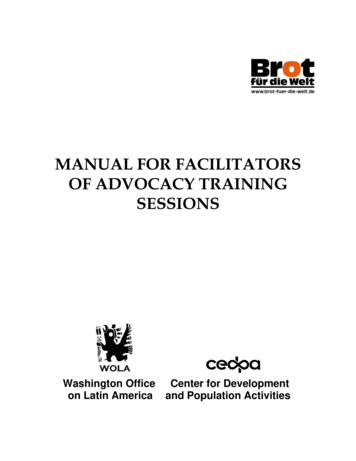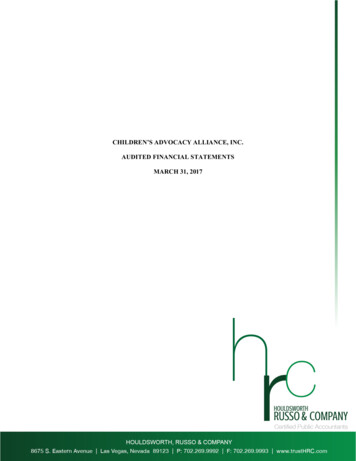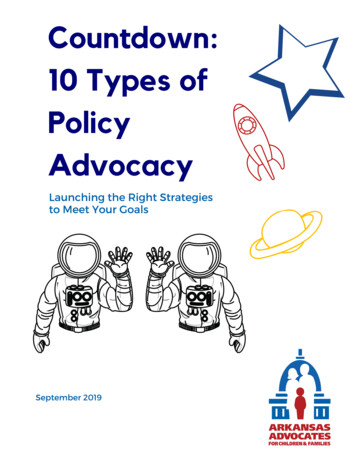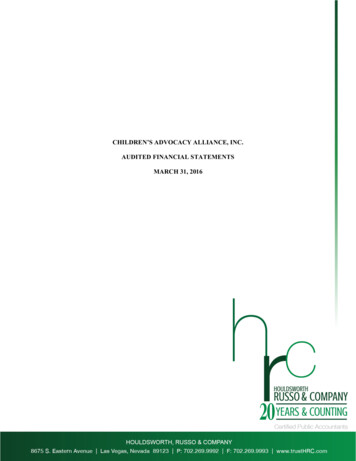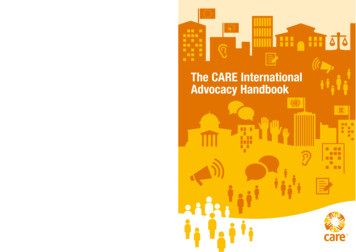
Transcription
Education Advocacy for Childrenin the Child Welfare System:A Symposium and Community ConversationHosted byAugust 12, 2016Generously underwritten bySymposium Planning Committee Members
Education Advocacy for Children in the Welfare System:A Symposium and Community ConversationProgram AgendaFriday, August 12, 2016Morning Plenary Sessions8:00 a.m.Continental Breakfast (Underwood Law Library Atrium)8:30 a.m. – 8:45 a.m. Welcome and Introduction to the Educational Goals of the SymposiumUnderwood Law Library, Hillcrest Classroom – Room 103Diane M. Sumoski, Esq. Director, W.W. Caruth, Jr. Institute for Children’s Rights8:45 a.m. – 9:00 a.m. The Present and Future of Education for Foster Children in DFPS Region 3Underwood Law Library, Hillcrest Classroom – Room 103George Cannata, Regional Director of Child Protective Services, Region 39:00 a.m. – 10:00 a.m. Lessons Learned Regarding the Promise of Education Rights for FosterChildrenUnderwood Law Library, Hillcrest Classroom – Room 103David Ray (Moderator), Program Coordinator for Homeless and FosterCare Education, Region 10 Education Service CenterJamie Bernstein, Staff Attorney, Permanent Judicial Commission forChildren, Youth, and FamiliesJenny Hinson, CPS Division Administrator for Permanency, DFPSJulie Wayman, Director, Dropout Prevention and Recovery Initiatives,Texas Education Agency10:00 a.m. – 10:15 a.m. Morning Break – Coffee provided (Underwood Law Library Atrium)10:15 a.m. – 11:15 a.m. Advocating for Traumatized Youth in SchoolUnderwood Law Library, Hillcrest Classroom – Room 103Heidi Román, M.D., Ambulatory Medical Director of the Rees-JonesCenter for Foster Care Excellence at Children’s Medical Center andAssistant Professor, UT Southwestern Medical CenterJaclyn Albin, M.D., Assistant Professor UT Southwestern Medical Center11: 15 a.m. – 12:00 p.m. Nothing About Us Without Us: The Foster Child’s Viewpoint on EducationAdvocacy NeedsUnderwood Law Library, Hillcrest Classroom – Room 103Moderator: Elisha Simpson, Regional Youth Specialist, CPS Region 3Panel featuring former foster children12:00 p.m.Networking LunchStorey Hall, Karcher AuditoriumSee end of program for map of SMU Dedman School of Law1
Education Advocacy for Children in the Welfare System:A Symposium and Community ConversationAfternoon Break-Out SessionsTrack One for Educators1:15 p.m. - 2:15 p.m. The Roles and Responsibilities of School System Foster Care LiaisonFlorence Hall, Room 107Wendy Brower, Garland I.S.D. Foster Care LiaisonEmily Jandrucko, Garland ISD Foster Care Case Manager2:15 p.m. – 2:30 p.m. Afternoon Break2:30 p.m. - 3:30 p.m.Understanding a Child’s Path Through the Child Protective ServicesSystemFlorence Hall, Room 107Beverly Rowden, LMSW, Regional Education Specialist, DFPSNorma Eaves, MSW, Regional Education Specialist, Region 3, DFPSTrack Two for Advocates and Caregivers1:15 p.m. - 2:15 p.m. Navigating the Educational System to Help “Your” Foster Child SucceedFlorence Hall, Room 201Rosemary Manges, Coordinator for Inclusive Services, Region 10Education Service Center2:15 p.m. – 2:30 p.m. Afternoon Break2:30 p.m. - 3:30 p.m. De-Mystifying the Admissions, Review, and Dismissal (“ARD”) ProcessFlorence Hall, Room 201Karen Slaughter, Special Populations Consultant, Region 10 EducationService CenterMatthew Trail, Esq. Staff Attorney, Disability Rights TexasTrack Three for Social Workers1:15 p.m. - 2:15 p.m. Best Practices to Help Foster Parents Help Their Foster Children AchieveAcademic SuccessFlorence Hall, Room 106Norma Eaves, MSW, Regional Education Specialist, Region 3, DFPSLarry Partin, LPC-S, Director of Mental Health Services, CK FamilyServices2:30 p.m. - 3:30 p.m. De-Mystifying the Admissions, Review, and Dismissal (“ARD”) ProcessFlorence Hall, Room 201Karen Slaughter, Special Populations Consultant, Region 10 EducationService CenterMatthew Trail, Esq. Staff Attorney, Disability Rights TexasAfternoon Plenary Session3:30 p.m. - 4:15 p.m.Bringing it All Together: De-Brief, Q&A, and Future CollaborationUnderwood Law Library, Hillcrest Classroom – Room 103Moderators: Cheri Leutz, Staff Attorney, Dallas CASAShelly Wilbanks, Esq. Staff Attorney, Dallas CASASee end of program for map of SMU Dedman School of Law2
Education Advocacy for Children in the Welfare System:A Symposium and Community ConversationDetailed Program AgendaFriday, August 12, 2016Morning Plenary Sessions8:45 a.m. – 9:00 a.m. The Present and Future of Education for Foster Children in DFPS Region 3Underwood Law Library, Hillcrest Classroom – Room 103George Cannata, Regional Director, Child Protective Services, Region 3Mr. Cannata will discuss the present status of educational outcomes for childrenin care, the new direction and vision for CPS in implementing legislation andpursuing its efforts to improve educational outcomes and education advocacyfor these children, and how advocates can engage in this vision.9:00 a.m. – 10:00 a.m. Lessons Learned Regarding the Promise of Education Rights for FosterChildrenUnderwood Law Library, Hillcrest Classroom – Room 103David Ray (Moderator), Program Coordinator for Homeless and Foster CareEducation, Region 10 Education Service CenterJamie Bernstein, Staff Attorney, Permanent Judicial Commission for Children,Youth, and FamiliesJenny Hinson, CPS Division Administrator for Permanency, DFPSJulie Wayman, Director, Dropout Prevention and Recovery Initiatives, TexasEducation AgencyThe panel will provide an overview of the challenges that face foster children insucceeding in school. The session will cover what the data collected through thePublic Education Information Management System (and otherwise) tells usabout educating foster youth, what the law requires regarding educating fosteryouth, and how advocates can use these legal lessons to improve educationoutcomes.10:15 a.m. – 11:15 a.m. Advocating for Traumatized Youth in SchoolUnderwood Law Library, Hillcrest Classroom – Room 103Heidi Román, M.D., Ambulatory Medical Director of the Rees-Jones Center forFoster Care Excellence at Children’s Medical Center and Assistant Professor,UT Southwestern Medical CenterJaclyn Albin, M.D., Assistant Professor UT Southwestern Medical CenterPediatricians for children in foster care explain how trauma impacts their healthand ability to learn and how partnering with medical professionals can benefitthese children in the school setting to ensure their educational needs and legalrights to education are being met.11: 15 a.m. – 12:00 p.m. Nothing About Us Without Us: The Foster Child’s Viewpoint on EducationAdvocacy NeedsUnderwood Law Library, Hillcrest Classroom – Room 103Moderator: Elisha Simpson, Regional Youth Specialist, CPS Region 3Panel featuring former foster childrenPanel of former foster care children tell their stories and discuss theirexperiences with the public school system, education advocacy in the courts,what assistance they had from attorneys, social workers, educators, and othersthat was, or would have been, helpful, how their education was impacted bybeing a foster child in the child welfare legal system, and what impact itcontinues to have on them now.See end of program for map of SMU Dedman School of Law3
Education Advocacy for Children in the Welfare System:A Symposium and Community Conversation1:15 p.m. - 2:15 p.m. The Roles and Responsibilities of the School System Foster Care LiaisonFlorence Hall, Room 107Wendy Brower, Garland I.S.D. Foster Care LiaisonEmily Jandrucko, Garland ISD Foster Care Case ManagerThe role of the foster care liaison, as mandated by federal law, will be fullydiscussed. How can the liaison help educators facing challenges working withfoster youth? When should educators reach out to the liaison? How can fostercare liaisons effectively fulfill their roles? How can these liaisons be utilized bylegal and other advocates to ensure that the legal rights of children in care areenforced in the education setting?1:15 p.m. - 2:15 p.m. Navigating the Educational System to Help “Your” Foster Child SucceedFlorence Hall, Room 201Rosemary Manges, Coordinator for Inclusive Services, Region 10 EducationService CenterWhat does the law require regarding school transitions, involvement inextracurricular activities, participation in tutoring, admission in gifted andtalented programs, and the provision of other services to make the foster child’seducational experience more effective? How is this legal framework applied inpractice? How can you tap into these resources for “your” foster child?1:15 p.m. - 2:15 p.m. Best Practices to Help Foster Parents Help Their Foster Children AchieveAcademic SuccessFlorence Hall, Room 106Norma Eaves, MSW, Regional Education Specialist, Region 3, DFPSLarry Partin, LPC-S, Director of Mental Health Services, CK Family ServicesThis program will provide tips for best practices to improve academic outcomesof foster children and youth. Through an overview of minimum standard rulesrelated to the responsibilities that foster parents have for the education of a childin care, the program will explore how those standards provide the foundation forbest practices to promote academic success. The program also will include acase study discussion of education improvements achieved through aninnovative behavioral health program where, with the support of the fosterparents, therapists accompanied foster children into the schools.2:30 p.m. - 3:30 p.m.Understanding a Child’s Path Through the Child Protective ServicesSystemFlorence Hall, Room 107Beverly Rowden, LMSW, Regional Education Specialist, DFPSNorma Eaves, MSW, Regional Education Specialist, Region 3, DFPSAn overview of the child welfare system, including terms, phrases, acronyms,and stages of service in the CPS system. The following questions will beaddressed: Who is legally mandated to report child abuse and neglect in Texas?Who are the key people involved with a child or youth in the foster care system?What impact and challenges does being in the system pose to the academicsuccess of children and youth?2:30 p.m. - 3:30 p.m. De-Mystifying the Admissions, Review, and Dismissal (“ARD”) ProcessFlorence Hall, Room 201Karen Slaughter, Special Populations Consultant, Region 10 Education ServiceCenterSee end of program for map of SMU Dedman School of Law4
Education Advocacy for Children in the Welfare System:A Symposium and Community ConversationMatthew Trail, Esq. Staff Attorney, Disability Rights TexasAn overview of the special education or “ARD” process mandated by Texas law,notices and timelines involved, and legal requirements. The session will discusshow to appropriately work with educators to design an Individual Education Plan(IEP) that enables foster children with special needs—physical, emotional, orlearning differences—to succeed in school.3:30 p.m. - 4:15 p.m. Bringing it All Together: De-Brief, Q&A, and Future CollaborationUnderwood Law Library, Hillcrest Classroom – Room 103Moderators: Cheri Leutz, Staff Attorney, Dallas CASAShelly Wilbanks, Esq. Staff Attorney, Dallas CASAAll Symposium attendees and presenters will convene to review critical issuesidentified through the day, ask burning questions, and propose ideas for nextsteps. How can we best work together to help children in the child welfaresystem achieve educational success?See end of program for map of SMU Dedman School of Law5
Education Advocacy for Children in the Welfare System:A Symposium and Community ConversationPresentersJaclyn Albin, MD, Assistant Professor, UT Southwestern Medical CenterDr. Albin received her medical degree from the George Washington School of Medicine. She completedher residency and chief residency in pediatrics and internal medicine at the Baylor College of Medicine.She is the Associate Program Director, Internal Medicine/Pediatrics Combined Residency Program, aPediatrician at the Rees-Jones Center for Foster Care Excellence, and a pediatrician and internist at theUTSW Combined MedPeds Clinic.Jamie Bernstein, Staff Attorney, Permanent Judicial Commission for Children, Youth, andFamiliesMs. Bernstein joined the Supreme Court of Texas as a staff attorney for the Permanent JudicialCommission for Children, Youth and Families in May 2014. She began her legal career in New Yorkwhere she represented children in child protective and delinquency proceedings. Her current focus is theimprovement of educational outcomes for children in the Texas foster care system.Wendy Brower, Foster Care Liaison, Garland ISDMs. Brower’s responsibilities, in addition to Foster Care Liaison, include Section 504 Coordinator for thedistrict, inclusive of General Education Homebound and Dyslexia; Dropout Prevention and Recovery; AtRisk Administrator; Enrollment and Transfers, and school assignments for the district's 58,000 studentsthrough the School Choice plan. She is responsible for various aspects of student enrollment andretention in the Garland Public Schools including development and implementation of the District'sdropout prevention and recovery plan; identification of and assurance of services for students in fostercare; planning, implementing, and processing of District's Choice of School Plan; student enrollment andtransfers; department webmaster; providing training and support to campus administration and staff.George Cannata, Regional Director of Child Protective Services, Region 3Mr. Cannata is the Regional Director of Child Protective Services (CPS) in Region 3. Mr. Cannata hasbeen with the agency for 19 years. He previously served as CPS Deputy Assistant Commissioner. Mr.Cannata has worked in Investigations and Family Based Safety Services, including working as the CPSAcademy Manager for 3 years. The majority of positions held by Mr. Cannata have been on asupervisory level. He served as a Program Administrator for Family Based Safety Services (FBSS) andInvestigations and as Program Director for Investigations and FBSS for 5 years. Mr. Cannata has beenactively involved in the Planning and Implementation Team for Foster Care Redesign, OperationsManual and IMPACT - Enhancement Trainer and Safety Decision Making Implementation Team. Mr.Cannata holds both a Bachelor's and Master's degree in Social Work. Mr. Cannata is dedicated toensuring the needs of children and families are met and that the focus remains on the CPS Vison ofChildren First, Protected and Connected.Norma Eaves, MSW, Education Specialist, Region 3, DFPSMs. Eaves' responsibilities as a Regional Education Specialist include advocating for the educationneeds of children in the Child Protective Services system. This includes consultation with caseworkers,attending school meetings, conducting trainings related to education advocacy, and collaborating withschools, Texas Education Agency, Education Service Centers, and other community stakeholders. Ms.Eaves has over 25 years of experience working in the human services field in both private and publicagencies. This includes work within child welfare/child protective services in Oklahoma and Texas, aswell as monitoring and investigation of licensed child care providers and residential child care providers.See end of program for map of SMU Dedman School of Law6
Education Advocacy for Children in the Welfare System:A Symposium and Community ConversationMs. Eaves holds a B.S. from Oklahoma State University and an MSW from University of Texas atArlington.Jenny Hinson, CPS Division Administrator for Permanency, DFPSMs. Hinson oversees the development and administration of policies and procedures that affect childrenin the conservatorship of Texas Department of Family Protective Services (Child Protective Services).Ms. Hinson manages subject matter experts in the fields of permanency, conservatorship policy, bestpractices for mental health and domestic violence, citizenship, immigration, and refugee services,education, and developmental disabilities. Ms. Hinson also serves as a member of the EducationSubcommittee for the Permanent Judicial Commission for Children, Youth & Families.Emily Jandrucko, Garland ISD Foster Care Case ManagerMs. Jandrucko’s primary concentration is aiding the District’s Foster Care Families and overseeing theGRS Giving Place. Her responsibilities are to ensure foster care students and families in GISD areaccurately identified and supported, and to ensure the maintenance, funding, and donation of resourcesfor the GRS Giving Place, which provides uniforms and supplies to families in need.Cheri Leutz, Esq., Staff Attorney and Supervisor, Dallas CASAMs. Leutz is a Staff Attorney and Supervisor at Dallas CASA where she advises CASA staff on legalissues, prepares staff and volunteer advocates for hearings and trial, and develops and facilitatestraining in legal matters related to child welfare, such as mediation and educational advocacy. During hertime at Dallas CASA, Ms. Leutz also helped to develop and facilitate an Advanced Advocacy trainingprogram aimed at increasing the effectiveness of the volunteers’ child advocacy. Prior to Dallas CASA,Ms. Leutz worked as an associate at Thompson & Knight LLP. Ms. Leutz graduated from University ofKansas School of Law in 2008 and holds a Bachelor of Social Work from University of Kansas.Rosemary Manges, Coordinator for Inclusive Services, Region 10 Education Service CenterRosemary Manges has over 40 years’ experience which encompasses all levels of education from the K12 general education and special education classrooms, campus and district administration, instructor atcollege/university levels and to the halls of TEA. She is currently a coordinator with Region 10 SpecialPopulations providing professional development and technical support to special educationadministrators.Larry Partin, LPC-S, Director of Mental Health Services, CK Family ServicesMr. Partin is the Director of Mental Health Services at CK Family Services. He received a Bachelor ofArts Degree from Dallas Baptist College in 1981, a Master of Divinity Degree from Southwestern BaptistTheological Seminary in 1983, and both a Master of Arts in Marriage and Family Counseling and aMaster of Arts in Religious Education from Southwestern Baptist Theological Seminary in 2002.David Ray, Program Coordinator for Homeless and Foster Care Education, Region 10 EducationService CenterDavid Ray currently works as a program coordinator for Region 10 Education Service Center in the areasof homeless and foster care education. He works with districts and charter schools across the state ofTexas to help develop policies and procedures that align with federal and state laws pertaining to therights of students in homeless and foster care situations. Prior to coming to the region 10 years ago,David worked as a teacher in self-contained special education classrooms.See end of program for map of SMU Dedman School of Law7
Education Advocacy for Children in the Welfare System:A Symposium and Community ConversationHeidi Román, MD, Ambulatory Medical Director for the Rees-Jones Center for Foster CareExcellence at Children’s Medical Center and Assistant Professor, UT Southwestern MedicalCenterDr. Román obtained her medical degree from the University of Wisconsin School of Medicine and PublicHealth. She completed her pediatric residency and chief residency at the UCSF Benioff Children’sHospital in Oakland, California. Prior to joining UT Southwestern, she spent six years as an attendingpediatrician at a federally qualified health center in San Jose, California, with a faculty appointment at theStanford University School of Medicine. Dr. Román is Ambulatory Medical Director of the Rees-JonesCenter for Foster Care Excellence at Children’s Medical Center.Beverly Rowden, LMSW, Regional Education Specialist with the Department of Family andProtective Services, Region 3 Child Protective Services.Ms. Rowden has over 20 years of combined human services experience in both public and privateagencies and has dedicated most of her career with Child Protective Services, where she has worked asa Conservatorship and Foster Care/Adoptions Specialist and currently as the Regional EducationSpecialist. She also serves on the Special Education, School Stability & Transition Subcommittees withthe Permanent Judicial Commission for Children, Youth & Families. Ms. Rowden holds a Master'sdegree in Social Work from the University of Texas in Arlington.Elisha Simpson, Regional Youth Specialist, CPS Region 3Ms. Simpson began her role as youth specialist in May 2016. She is a former foster youth who advocatesfor youth and helps guide them with their transition out of foster care. She facilitates Youth LeadershipCouncil for Region 3. Ms. Simpson coordinates with staff and work groups to provide youth/alumniperspective into practice, procedures, and policies related to youth currently or formerly in care. Assistswith development of core services, policies and procedures related to services provided to foster careyouth. She promotes the role of advocacy and public education at the community and regional levelsregarding issues facing youth transitioning out of care. Ms. Simpson is currently pursuing a degree inSociology.Karen Slaughter, Special Populations Consultant, Region 10 Education Service CenterKaren Slaughter is a Special Populations Consultant at Region 10 ESC. She has over 25 years ofexperience that include working as a Special Education Director/Coordinator in a charter school, aspecial education teacher in the Dallas ISD, and an adjunct professor at a community college. Karen hasbeen involved in developing curriculum and professional development events. Karen has Texas teachingcertifications in Special Education, English as a Second Language, and Psychology. She received a BSdegree in special education from the University of Texas at Dallas and a MS degree in computer sciencefrom East Texas State University.Diane Sumoski, Esq., Director, W.W. Caruth, Jr. Institute for Children’s Rights at SMU DedmanSchool of LawMs. Sumoski is the Director of the W. W. Caruth, Jr. Institute for Children’s Rights at the Dedman Schoolof Law at Southern Methodist University. The Institute’s current focus is on improving educationoutcomes for children in the foster care system. She is also the Director of the Law School’s W.W.Caruth, Jr. Child Advocacy Clinic, where she supervises law students in their representation of childrenin the child welfare system as the children’s guardian and attorney ad litem. Ms. Sumoski hasrepresented women and children in family law matters on a pro bono basis for virtually the entirety of her29 year legal career. Ms. Sumoski has been listed in Best Lawyers in America since 2010 and has heldnumerous leadership positions in the Litigation Section of the ABA, including Director of its PublicService Division.See end of program for map of SMU Dedman School of Law8
Education Advocacy for Children in the Welfare System:A Symposium and Community ConversationMatthew Trail, Esq., Staff Attorney, Disability Rights TexasMr. Trail received his undergraduate degree in 1999 in communications-journalism from the University ofTennessee in Knoxville. He worked for two years as a journalist in Texas and North Carolina beforereturning to Tennessee for law school. After graduating law school from the University Of TennesseeCollege Of Law in 2004, he joined the U.S. Peace Corps and was stationed in Albania. While in thePeace Corps, Mr. Trail worked on a variety of community projects with local NGOs assisting poorchildren and trafficking victims. Upon returning to the United States, he began work as a judicial clerkand worked for the Florida Equal Justice Center in Fort Myers, before coming to Disability Rights Texas.Julie Wayman, Director, Dropout Prevention and Recovery Initiatives, Texas Education AgencyMs. Wayman oversees foster care education initiatives and other student success policies at TEA. Sheserves on the Children’s Commission Education Committee and chairs the Data Workgroup. She joinedTEA in 2008 after spending 6 years as executive director for an Ohio CASA/GAL program, serving on thestate board and initiating a model family resource center in an urban juvenile court. Since 1981 she hasworked in rural and urban Texas school districts, state agencies and with community organizations oninitiatives to support at-risk children, youth and families. Ms. Wayman holds a BSW from Bowling GreenState University and an MSW from the University of Texas at Austin.Shelly Wilbanks, Esq., Staff Attorney, Dallas CASAMs. Wilbanks is a Staff Attorney and Supervisor at Dallas CASA where she advises CASA staff on legalissues, prepares staff and volunteer advocates for hearings and trial, and develops and facilitatestraining in legal matters related to child welfare, such as mediation and educational advocacy. Ms.Wilbanks spent ten years in the informational technology industry before obtaining her law degree tobecome an advocate for abused women and children. Prior to Dallas CASA, Ms. Wilbanks worked as aprosecutor with a caseload including child welfare, mental health, family violence, and juvenile criminalcases, then as a private family law attorney handling highly contested divorce and child custody cases.She has been published in the Texas Prosecutor and law enforcement journals as well as a barassociation journal. Ms. Wilbanks graduated from Southern Methodist University Dedman School of Lawin 2009 and holds a B.A. in Journalism from Texas Tech University.See end of program for map of SMU Dedman School of Law9
Education Advocacy for Children in the Welfare System:A Symposium and Community ConversationNote:10 Parking for Symposium located in Daniel Ave. Parking Garage Hillcrest Classroom located in Underwood Law Library Afternoon sessions located in Florence Hall Breakfast and Lunch located in Storey Hall
Norma Eaves, MSW, Regional Education Specialist, Region 3, DFPS . Larry Partin, LPC-S, Director of Mental Health Services, CK Family Services . This program will provide tips for best practices to improve academic outcomes of foster children and youth. Through an overview of minimum standard rules







